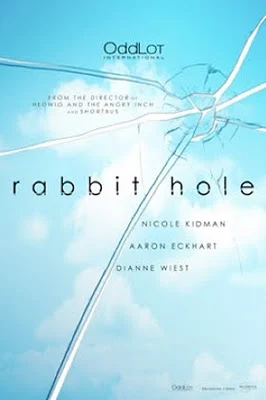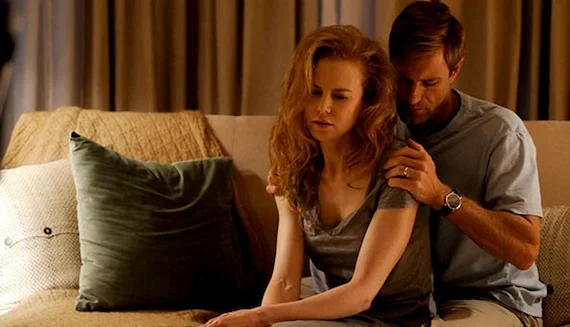
I really expected to dislike Rabbit Hole. After two masterpieces of flamboyance – Shortbus and Hedwig and the Angry Inch – I felt betrayed that John Cameron Mitchell would direct something so drab and suburban. Make no mistake, the story of Becca and Howie Corbett (Nicole Kidman and Aaron Eckhart) and how they cope with the sudden accidental death of their toddler is drab and suburban. However, by avoiding the cliches and pitfalls of the "depressing Oscar-bait drama" genre and by taking the plot and characters in genuinely surprising directions, Mitchell and co. eke out a win.
The movie's first act is exactly what I hoped it wouldn’t be. In the eight months since the death of her son Becca has grown icy and removed from her husband and the world. Howie puts on a brave face, but is grasping for straws. He's the one who encourages them to go to group counciling. He's the one who pushes for them to start hanging out with friends and having sex again. He probably has a few Dr. Phil books on the bedstand. Becca predictably lashes out at a group session, embarrassing Howie and driving the wedge between them deeper. It's all very pedestrian.
Then Becca begins secretly meeting with Jason, the awkward teenager who killed her son by driving too fast through their neighborhood. This relationship, and how it effects her relationship with Howie, is Rabbit Hole's emotional and thematic center. It's what separates this from other movies like it. The direction the movie takes from there dislodges the audience as much as it does the characters.

It is admittedly disappointing that this project eschews so much what I love about John Cameron Mitchell’s other work – queer identity and fluid modes of sexuality, music, animation. But for what it is, Rabbit Hole is fantastic, and manages to avoid all of the trappings a movie like this should easily fall into. During a Q and A after the screening, John Cameron Mitchell talked about how he hopes his movies can be used as tools to make life’s awful moments a little brighter and make the joyful moments even better. I think his point gives me an idea about how Rabbit Hole aligns with his other movies. As Mitchell noted, all of his movies feature a protagonist who is isolating herself from the family growing around her, and who only finds peace once she lets go and accepts the tides of life that bring these families together. Mitchell’s movies are all about developing nontraditional families through intuition more than logic. Maybe the family in Rabbit Hole is slightly more traditional than those in Hedwig or Shortbus but the curve ball connective spark between Becca and Jason breaks shallower assumptions about how the grief stricken learn to reconnect.
Rabbit Hole lacks up front and center music and animation, two of Mitchell's other identifiable staples. Anton Sanko's score is predictably delicate and sappy. I understand that this is not constructive criticism, as I can't think of a better way the movie should have been scored. Nevertheless, the gently plucked guitars and syrupy strings are less inspired than other elements. Mitchell's fascination with animation receives a subtle nod. Becca discovers that Jason is illustrating a comic book called Rabbit Hole about being able to look into and visit other dimensions. His almost neurotic obsession with alternate universes says what needs to be said about his overwhelming guilt better than any outpouring of grief could.
For a movie about straight, white, upper class New Englanders, Rabbit Hole still captures some glimmer of Mitchell’s personality. Through these characters, we see how quickly and easily WASPish foundations can falter. Becca, Howie, and Jason find themselves doing, saying, and thinking things that are not at all in harmony with the personas they’ve set out to maintain. It’s very difficult for me to identify with boring suburban white people, and any misgivings I had or have about Rabbit Hole stem entirely from the world in which it is set. However, it speaks to the movie’s power and effectiveness that even I was won over in the end. I hope Rabbit Hole is a stopgap in John Cameron Mitchell’s career. As long as he hasn’t permanently moved beyond the Hedwigs and Shortbuses, Rabbit Hole will be a cherished addition to his body of work.
-Ben